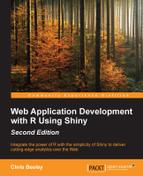There are almost as many uses for R as there are people using it. It is not possible to cover your specific needs within this book. However, it is likely that you wish to use R to process, query, and visualize data such as sales figures, satisfaction surveys, concurrent users, sporting results, or whatever types of data your organization processes. Later chapters will concentrate on Google Analytics data downloaded from the API, but for now, let's just take a look at the basics.
There are many books and online materials that cover all aspects of R. The name R can make it difficult to come up with useful web search hits (substituting CRAN for R can sometimes help); nonetheless, searching for R tutorial brings back useful results. Some useful resources include the following:
- Excellent introduction to syntax and data structures in R (goo.gl/M0RQ5z)
- Videos on using R from Google (goo.gl/A3uRsh)
- Swirl (swirlstats.com)
- Quick-R (statmethods.net)
At the R console, ?functionname (for example, ?help) brings up help materials and use of ??help will bring up a list of potentially relevant functions from installed packages.
Subscribing to and asking questions on the R-help mailing list at r-project.org/mail.html allows you to communicate with some of the leading figures in the R community as well as many other talented enthusiasts. Do read the posting guide and research your question before you ask any questions because it's a busy and sometimes unforgiving list.
There are two Stack Exchange communities, which can provide further help at stats.stackexchange.com/ (for questions about statistics and visualization with R) and stackoverflow.com/ (for questions about programming with R).
There are many ways to learn R and related subjects online; RStudio has a very useful list on their website available at goo.gl/8tX7FP.
